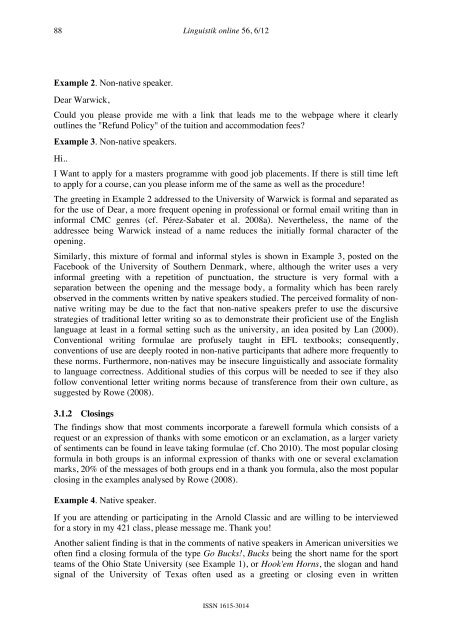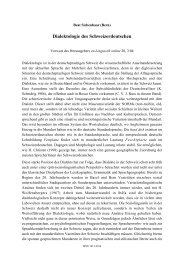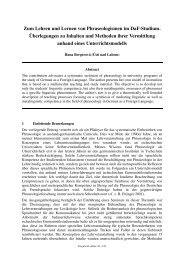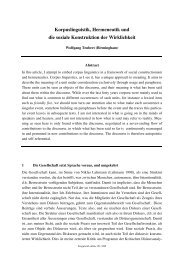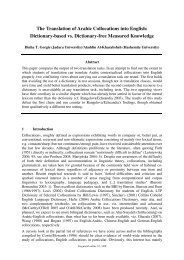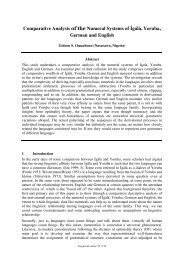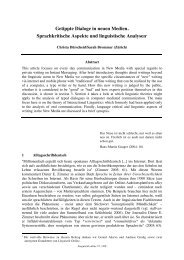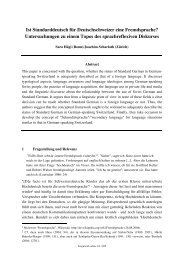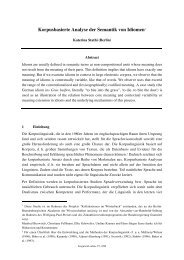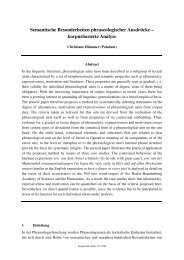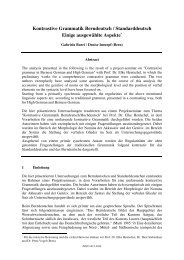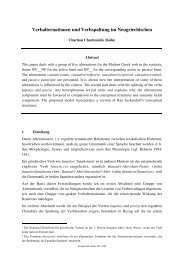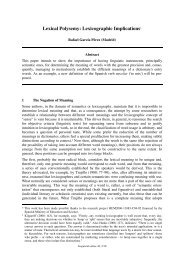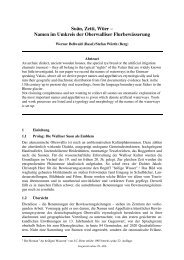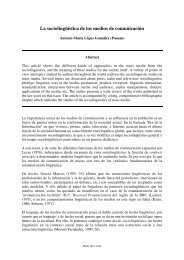88<strong>Linguistik</strong> <strong>on</strong>line 56, 6/12Example 2. N<strong>on</strong>-native speaker.Dear Warwick,Could you please provide me with a link that leads me to the webpage where it clearlyoutlines the "Refund Policy" <str<strong>on</strong>g>of</str<strong>on</strong>g> the tuiti<strong>on</strong> and accommodati<strong>on</strong> fees?Example 3. N<strong>on</strong>-native speakers.Hi..I Want to apply for a masters programme with good job placements. If there is still time leftto apply for a course, can you please inform me <str<strong>on</strong>g>of</str<strong>on</strong>g> the same as well as the procedure!The greeting in Example 2 addressed to the University <str<strong>on</strong>g>of</str<strong>on</strong>g> Warwick is formal and separated asfor the use <str<strong>on</strong>g>of</str<strong>on</strong>g> Dear, a more frequent opening in pr<str<strong>on</strong>g>of</str<strong>on</strong>g>essi<strong>on</strong>al or formal email writing than ininformal CMC genres (cf. Pérez-Sabater et al. 2008a). Nevertheless, the name <str<strong>on</strong>g>of</str<strong>on</strong>g> theaddressee being Warwick instead <str<strong>on</strong>g>of</str<strong>on</strong>g> a name reduces the initially formal character <str<strong>on</strong>g>of</str<strong>on</strong>g> theopening.Similarly, this mixture <str<strong>on</strong>g>of</str<strong>on</strong>g> formal and informal styles is shown in Example 3, posted <strong>on</strong> the<strong>Facebook</strong> <str<strong>on</strong>g>of</str<strong>on</strong>g> the University <str<strong>on</strong>g>of</str<strong>on</strong>g> Southern Denmark, where, although the writer uses a veryinformal greeting with a repetiti<strong>on</strong> <str<strong>on</strong>g>of</str<strong>on</strong>g> punctuati<strong>on</strong>, the structure is very formal with aseparati<strong>on</strong> between the opening and the message body, a formality which has been rarelyobserved in the comments written by native speakers studied. The perceived formality <str<strong>on</strong>g>of</str<strong>on</strong>g> n<strong>on</strong>nativewriting may be due to the fact that n<strong>on</strong>-native speakers prefer to use the discursivestrategies <str<strong>on</strong>g>of</str<strong>on</strong>g> traditi<strong>on</strong>al letter writing so as to dem<strong>on</strong>strate their pr<str<strong>on</strong>g>of</str<strong>on</strong>g>icient use <str<strong>on</strong>g>of</str<strong>on</strong>g> the Englishlanguage at least in a formal setting such as the university, an idea posited by Lan (2000).C<strong>on</strong>venti<strong>on</strong>al writing formulae are pr<str<strong>on</strong>g>of</str<strong>on</strong>g>usely taught in EFL textbooks; c<strong>on</strong>sequently,c<strong>on</strong>venti<strong>on</strong>s <str<strong>on</strong>g>of</str<strong>on</strong>g> use are deeply rooted in n<strong>on</strong>-native participants that adhere more frequently tothese norms. Furthermore, n<strong>on</strong>-natives may be insecure linguistically and associate formalityto language correctness. Additi<strong>on</strong>al studies <str<strong>on</strong>g>of</str<strong>on</strong>g> this corpus will be needed to see if they als<str<strong>on</strong>g>of</str<strong>on</strong>g>ollow c<strong>on</strong>venti<strong>on</strong>al letter writing norms because <str<strong>on</strong>g>of</str<strong>on</strong>g> transference from their own culture, assuggested by Rowe (2008).3.1.2 ClosingsThe findings show that most comments incorporate a farewell formula which c<strong>on</strong>sists <str<strong>on</strong>g>of</str<strong>on</strong>g> arequest or an expressi<strong>on</strong> <str<strong>on</strong>g>of</str<strong>on</strong>g> thanks with some emotic<strong>on</strong> or an exclamati<strong>on</strong>, as a larger variety<str<strong>on</strong>g>of</str<strong>on</strong>g> sentiments can be found in leave taking formulae (cf. Cho 2010). The most popular closingformula in both groups is an informal expressi<strong>on</strong> <str<strong>on</strong>g>of</str<strong>on</strong>g> thanks with <strong>on</strong>e or several exclamati<strong>on</strong>marks, 20% <str<strong>on</strong>g>of</str<strong>on</strong>g> the messages <str<strong>on</strong>g>of</str<strong>on</strong>g> both groups end in a thank you formula, also the most popularclosing in the examples analysed by Rowe (2008).Example 4. Native speaker.If you are attending or participating in the Arnold Classic and are willing to be interviewedfor a story in my 421 class, please message me. Thank you!Another salient finding is that in the comments <str<strong>on</strong>g>of</str<strong>on</strong>g> native speakers in American universities we<str<strong>on</strong>g>of</str<strong>on</strong>g>ten find a closing formula <str<strong>on</strong>g>of</str<strong>on</strong>g> the type Go Bucks!, Bucks being the short name for the sportteams <str<strong>on</strong>g>of</str<strong>on</strong>g> the Ohio State University (see Example 1), or Hook'em Horns, the slogan and handsignal <str<strong>on</strong>g>of</str<strong>on</strong>g> the University <str<strong>on</strong>g>of</str<strong>on</strong>g> Texas <str<strong>on</strong>g>of</str<strong>on</strong>g>ten used as a greeting or closing even in writtenISSN 1615-3014
Carmen Pérez-Sabater:The linguistics <str<strong>on</strong>g>of</str<strong>on</strong>g> social networking: A study <str<strong>on</strong>g>of</str<strong>on</strong>g> writing c<strong>on</strong>venti<strong>on</strong>s <strong>on</strong> <strong>Facebook</strong>89documents. 2 Together with colours, mascots and s<strong>on</strong>gs, slogans are the distinctive elements <str<strong>on</strong>g>of</str<strong>on</strong>g>a particular instituti<strong>on</strong> in American universities (cf. Toma 2003). These slogans serve todisplay the culture <str<strong>on</strong>g>of</str<strong>on</strong>g> the university in tangible and unique forms. Relatedly, moreover, theiruse in the comments reinforces the sense <str<strong>on</strong>g>of</str<strong>on</strong>g> community in social networking, it helpsparticipants to create comm<strong>on</strong> ground, an important communicative purpose <str<strong>on</strong>g>of</str<strong>on</strong>g> <strong>on</strong>lineinteracti<strong>on</strong> (cf. Yus 2011). Slogans are privative <str<strong>on</strong>g>of</str<strong>on</strong>g> a specific community and <strong>on</strong>ly shared bymembers <str<strong>on</strong>g>of</str<strong>on</strong>g> a prestigious social group formed by students or former alumni <str<strong>on</strong>g>of</str<strong>on</strong>g> a university.The frequent use <str<strong>on</strong>g>of</str<strong>on</strong>g> these slogans suggests that a study <str<strong>on</strong>g>of</str<strong>on</strong>g> culturally dependent <strong>on</strong>lineinteracti<strong>on</strong> could be a follow up task with an exclusive and thorough analysis <strong>on</strong> the use <str<strong>on</strong>g>of</str<strong>on</strong>g>social networking in American Universities and in some British universities that share thesecultural forms such as the University <str<strong>on</strong>g>of</str<strong>on</strong>g> Oxford or Cambridge, although no use <str<strong>on</strong>g>of</str<strong>on</strong>g> slogans asclosings has been found in the British universities studied.As for stylistic c<strong>on</strong>sistency between openings and closings, c<strong>on</strong>trarily to the studies <str<strong>on</strong>g>of</str<strong>on</strong>g> Gains(1999) or Chiluwa (2010) <strong>on</strong> email, where sign-<str<strong>on</strong>g>of</str<strong>on</strong>g>fs are more formal than greetings, in thiscorpus <str<strong>on</strong>g>of</str<strong>on</strong>g> comments <strong>on</strong> <strong>Facebook</strong> the correlati<strong>on</strong> between the formality <str<strong>on</strong>g>of</str<strong>on</strong>g> openings andclosings is clear in most cases. Most participants <strong>on</strong> <strong>Facebook</strong> show c<strong>on</strong>sistent levels <str<strong>on</strong>g>of</str<strong>on</strong>g>formality. However, some excepti<strong>on</strong>s where writers do not observe a clear pattern <str<strong>on</strong>g>of</str<strong>on</strong>g>formality are worth menti<strong>on</strong>ing. Example 4, written by a n<strong>on</strong>-native speaker <str<strong>on</strong>g>of</str<strong>on</strong>g> English <strong>on</strong> thesite <str<strong>on</strong>g>of</str<strong>on</strong>g> the University <str<strong>on</strong>g>of</str<strong>on</strong>g> Warwick, shows no opening but a very formal closing structure withtwo secti<strong>on</strong>s.Example 5. Commentary <strong>on</strong> <strong>Facebook</strong> n<strong>on</strong>-native speaker.I really hope to c<strong>on</strong>tinue my engineering master degree studies at this campus.I had time to attend british council jakarta time the other day was held at the Ritz Carlt<strong>on</strong>Hotel and are excited to c<strong>on</strong>tinue my study at this campushopefully my future goals can be achieved by c<strong>on</strong>tinuing the study at this campus amenbest regardsMupriyadi Kamzahfrom Ind<strong>on</strong>esia^___^On the other hand, this formal closing structure and the use <str<strong>on</strong>g>of</str<strong>on</strong>g> best regards doesn't correlatewith informal features such as the absence <str<strong>on</strong>g>of</str<strong>on</strong>g> capital letters, punctuati<strong>on</strong>, spelling mistakesand an emotic<strong>on</strong>, a combinati<strong>on</strong> <str<strong>on</strong>g>of</str<strong>on</strong>g> formal and informal registers observed in other CMCgenres such as fora (cf. M<strong>on</strong>tero-Fleta et al. 2009).A rather different situati<strong>on</strong> is found in the examples from native writers <strong>on</strong> <strong>Facebook</strong>, whoseem to write more c<strong>on</strong>sistently and avoid the use <str<strong>on</strong>g>of</str<strong>on</strong>g> any formality in their comments. Thismay imply that for native speakers <str<strong>on</strong>g>of</str<strong>on</strong>g> English, comments <strong>on</strong> <strong>Facebook</strong> is an informal genrealready c<strong>on</strong>venti<strong>on</strong>alized, regardless <str<strong>on</strong>g>of</str<strong>on</strong>g> its setting.3.2 Discussi<strong>on</strong>The findings show that even within a single form <str<strong>on</strong>g>of</str<strong>on</strong>g> CMC there can be important differences.In the comments posted <strong>on</strong> the <strong>Facebook</strong> sites <str<strong>on</strong>g>of</str<strong>on</strong>g> these organisati<strong>on</strong>s, there is a clear diversity<str<strong>on</strong>g>of</str<strong>on</strong>g> use. On the <strong>on</strong>e hand, we can observe that the comments <strong>on</strong> some universities' sites exhibitmany features <str<strong>on</strong>g>of</str<strong>on</strong>g> a synchr<strong>on</strong>ous CMC genre, i. e., a chat where participants give their opini<strong>on</strong><strong>on</strong> a topic or <strong>on</strong> a picture, in a very informal style without any type <str<strong>on</strong>g>of</str<strong>on</strong>g> introducti<strong>on</strong>, and very2 cf. http://www.utexas.edu/alumni-friends/ut-traditi<strong>on</strong>s/hook-em-horns, accessed November 19, 2012.ISSN 1615-3014


